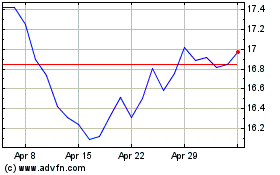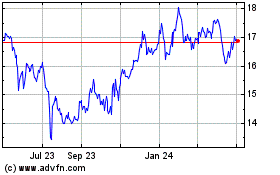Samsung Tests How 5G Can Improve Chip-Making
August 14 2019 - 4:44PM
Dow Jones News
By Sara Castellanos
Samsung Electronics Co. is testing how fifth-generation wireless
networks can speed up connections at its chip-making factory in
Austin, Texas, a pilot that aims to prove 5G is more than a
buzzword.
The company has teamed up with AT&T Inc.'s communications
division to develop a customized 5G network to experiment with how
it could be used in chip manufacturing.
The fifth generation of cellular networking, 5G is designed to
replace current 4G technology, also known as LTE. The ultrafast
speeds and reduced lag that will come with 5G will buttress new
applications such as augmented reality and self-driving cars. Peak
download speeds using 5G are expected to be about 100 times as fast
as with 4G.
The transformation that will come from widespread commercial 5G
deployments in manufacturing, logistics, transportation and energy
is still about a decade away, experts have said. That's partly
because it will take time to roll out the infrastructure to achieve
full 5G coverage.
In the meantime, Samsung and other companies are testing 5G's
potential in limited pilots to show what the technology can do.
"We're still in the experimentation phase, but we're hopeful
there's value," said Alok Shah, vice president of networks
strategy, business development and marketing at Samsung Electronics
America, the company's U.S. unit.
Factories will be a big beneficiary of 5G connections, said
Andre Fuetsch, chief technology officer for AT&T
Communications, AT&T's biggest division.
"We see 5G being a great solution for solving a lot of the Wi-Fi
issues that typical factories have today," he said. The technology,
for example, could be used on manufacturing floors to power more
reliable connections for computer-vision-scanning equipment that
checks product quality.
AT&T has also rolled out consumer 5G networks in about 20
U.S. cities.
Samsung Electronics America and AT&T have invested millions
of dollars in 5G innovation at Samsung's chip-manufacturing
facility in Austin. Thousands of employees work at the chip
factory, which is the size of about 10 football fields, Mr. Shah
said.
Chip-making uses a lot of water and toxic chemicals; 5G could
help chip factories cut waste and alert workers to safety
hazards.
For example, 5G would allow more sensors to be installed to
detect air quality, Mr. Shah said. Streaming real-time data from
the sensors over 5G networks would mean that a control center can
immediately detect serious air-quality hazards and move people out
of harm's way. Sensors in factories today can't rely on existing
wireless networks to pass along warnings to a control center, Mr.
Shah said.
"Being able to put thousands of sensors within a relatively
small space is hard for other [networking] technologies to
support," Mr. Shah said. Certain networks can only support a finite
number of devices. Fifth-generation wireless networks could support
1 million devices per square kilometer, up from about 100,000
devices per square kilometer with 4G LTE, he said.
Sensors on pumps and valves could also stream data about water
usage over 5G networks so the facility can improve the efficiency
of its water usage in real time and reduce waste.
Using 5G connections, workers could also learn how to repair
equipment on the factory floor through augmented and
virtual-reality headsets without any buffering or lags.
Other companies including New York Times Co. and German
engineering firm Robert Bosch GmbH are testing 5G in pilots. The
market for 5G, including related network infrastructure, is
forecast to grow to $26 billion in 2022 from $528 million in 2018,
according to research firm International Data Corp.
The tests are often "showcase demonstration pieces," useful for
proving that 5G could generate revenue through new services or make
processes more efficient, said Jason Leigh, research manager for
mobility and 5G at IDC.
"The sooner you can get something tangible, it makes it easier
to have that discussion at a C-suite and board level about what 5G
really is, and it's not just this fad," Mr. Leigh said.
Write to Sara Castellanos at sara.castellanos@wsj.com
(END) Dow Jones Newswires
August 14, 2019 16:29 ET (20:29 GMT)
Copyright (c) 2019 Dow Jones & Company, Inc.
AT&T (NYSE:T)
Historical Stock Chart
From Mar 2024 to Apr 2024

AT&T (NYSE:T)
Historical Stock Chart
From Apr 2023 to Apr 2024
